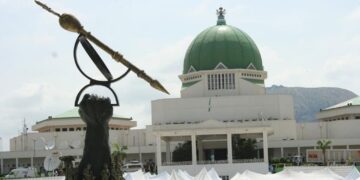[ad_1]
The media tradition of naming one person or thing with the most impact on a particular year can be very controversial and it has always been, because a year should be too much for a who or what to represent, for better or for worse. Add this, to the fact that Nigeria is always bursting at the hems with occurrences, with both state and non-state actors, playing prominent roles.
In past years, final choices had been contentious, when impacts are judged against the verdicts of history. 2022 is, however different. No one will and should, deny the dauntlessness with which Nigerians have faced the besetting vicissitudes of fortune in their daily existence.
In the exiting year, all that could go wrong, went wrong and it was nearly all that were to human existence and dignity. Economic, security, social and political hell unfurled on the country and her citizens in what could pass for a connivance of the months that made up the year, as each succeeding month poured more misery.
Food, even the staple, practically disappeared from homes. Unprecedented inflation saw to further mediocrity of the Naira, the country’s currency, without meaningful cushioning efforts from policy-makers, whose actions and inactions in the first place, pushed millions of people, down the pecking order of decent living.
It was so bad that the state itself came out in July to declare depressing poverty statistics. One of its agencies, the Nigerian Bureau of Statistics (NBS) disclosed that over 133 million Nigerians, representing 63 percent of the entire population, had officially acquired the poverty status. Despite the frightening official figure, there are still skeptics who doubted if the official number wasn’t under-quoted, in the face of grim existential reality daily confronting the masses.
But the Nigerian man, the Nigerian woman, the Nigerian boy, the Nigerian girl, the Nigerian oldie, the Nigerian youngster, has trudged on, wobbling and hobbling along the line, but not crushed.
The widespread insecurity which has further devalued life around the country, hasn’t stopped the Nigerian from being hopeful, though thousands, if not millions, daily seek escape routes from the living hell, which the country with crude oil but dry petrol pumps, has become.
Even those seeking ways out of the country, legally and otherwise, are still driven by the hope that life can still be more meaningful than what Nigeria offers.
Those staying back are also being driven by hope of a better tomorrow, despite the distressing signals all over that the country is just one or two parameters away from officially becoming a banana republic or a failed state.
In a July 2022 report on economic outlook of endangered countries, which unsurprisingly featured Nigeria, Reuters, quoting the leadership of the International Monetary Fund (IMF) disclosed that “a record number of developing countries are currently in difficulty as several countries are exhibiting economic malaise similar to Sri Lanka, including typical debt crises, indications of collapsing currencies, 1,000 basis point bond spreads, and FX reserves.”
The news medium went ahead to say that “rising borrowing prices, inflation and debt all fuel concerns of an economic collapse, with analysis showing that Sri Lanka, Lebanon, Russia, Suriname and Zambia are already in debt default Belarus is on the verge of default, and at least another dozen countries are in danger of default.
“The total price is staggering. Analysts estimate that $400 billion of debt is at risk using 1,000 basis point bond spreads as a pain threshold. Argentina is the biggest, with over $150 billion, followed by Ecuador and Egypt, each with between $40 and $45 billion.”
Nigeria is placed in the ninth position.
Yet the people are carrying on with a kind of stoicism that many critics have slammed as docility for not consistently demanding, through civil actions, that government should protect them from the myriad challenges confronting them. In fact, the enthusiasm to have another government in power next year is tumultuous, possibly driven by the same hope for a better next year and years ahead.
2022 dealt so cruelly with Nigerians that they could no longer smile through their pains, leading to the country, dropping off the chart of 100 happiest people in the world. The top spot, which Nigerians used to hold, had been yielded to Finland, a country of 5.516 million people.
World Happiness Report, in situating the ascendancy of Finland, says, “Quite surprisingly, the people of Finland, a country with severely cold weather and dark Arctic winters, are much more happy than the residents of many other developed countries of the world which offer more warmth and sunshine-filled days to their citizens.
“Several factors are considered to be responsible for the happiness of the Finnish people. Economic stability and security, high wages, honest governments, low levels of corruption, and high literacy rates keep the people of this country relatively stress-free. The socioeconomic gap among the Finnish population is also quite low.
“The Finnish society is also broad-viewed and highly tolerant in nature. Health care, education and other infrastructural facilities are also well equipped and sufficient to serve the Finnish population to a satisfactory level. The people of this country also like to maintain a healthy work life balance with less working hours and plenty of annual vacations to keep life stress-free” the report noted.
In 2003, when Nigerians were first hoisted by World Value Survey as the happiest, they didn’t have all listed for Finland. In 2014, when World Happiness Report put Nigerians top of the happiness chart, things had begun deteriorating, but Rod Dreher, an expert in gauging feelings, attributed the ascendancy to Nigerians being “super-religious.”
A Gallup poll in 2012 found out that 88 percent of the populace were optimistic about their future. Now, in 116th position on World Happiness Index, Nigerians are understandably not joyful, considering the rock-bottom the country hit in 2020 as the poverty capital of the world, with 86.9 million of her population living in severe poverty.
But the people are still marching on, trying to live a day at a time without causing major disruptions to societal orderliness around them. That isn’t the expectation of history. Suffering of the kind Nigerians are daily riding, has caused the collapse of many governments in history. The Nigerian people are however not completely without a blame, for always making wrong leadership choices and not collectively holding their representatives to dire accountability inquest.
In measuring the impacts of strain/stress on an object, physicists listed three possible outcomes, which include Elasticity, Plasticity and Breaking Point. Though interrelated, the three phenomena speak to varied capacities of objects to undergo stress/strain and remain “normal”.
If applied to the Nigerian situation, Nigerians should be at the Breaking Point mode by now, but strangely the endurance capacity has kept the appearance between Elasticity and Plasticity. Maybe it is because they are “super religious”.
For taking so much heat and hit and still standing, no one or thing would be deserving of the credit of the outgoing year more than the resilient Nigerian.
YOU SHOULD NOT MISS THESE HEADLINES FROM NIGERIAN TRIBUNE
PICTORIAL EXPLAINER: How To Identify Fake New Naira Notes
The Central Bank of Nigeria (CBN) has released security features to help identify fake new naira notes. According to CBN’s template, the Security features to look out for are the following…
Ondo Councils’ Workers Shut Down Assembly Over LG Autonomy
LOCAL government workers under the aegis of Nigeria Union of Local Government Employees (NULGE), Ondo, on Tuesday, stormed the State House of Assembly, threatening a showdown with the lawmakers over the signing of local government autonomy…
FG To Discontinue Cash Withdrawal From Public Accounts
The Federal Government is putting the final touches to all necessary measures to stop cash withdrawal from federal, state, and local government accounts. The Director/Chief Executive Officer of the Nigerian Financial Intelligence Unit (NFIU), Modibbo Hamman Tukur, revealed…
Reps Probe Crude Oil Sales Over $2.4bn Revenue Loss
The House of Representatives on Tuesday unveiled plans to investigate the allegation bothering on the alleged loss of over $2.4 billion in revenue accruing from the illegal sale of 48 million barrels of crude oil export from 2014 till date…
Emefiele/DSS Tango: Falana Asks Judiciary To Treat Civil Liberty Cases Equally
LEADING rights lawyer, Mr. Femi Falana, on Tuesday addressed the controversial move by the nation’s secret police to arrest and detain the embattled Governor of the Central Bank of Nigeria (CBN), Godwin Emefiele…
EDITORIAL: CBN’s New Cash Withdrawal Limits
As a follow-up to its redesign of the N200, N500, and N1000 banknotes, the Central Bank of Nigeria (CBN) recently announced a new policy that mandates deposit money banks and other financial institutions to ensure that…
[ad_2]






